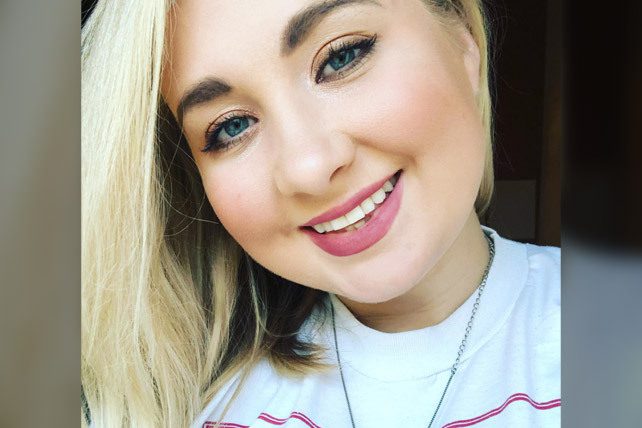In an exclusive interview with ChurchLeaders, Hannah-Kate Williams, a survivor of sexual abuse in the Southern Baptist Convention (SBC), shared that despite the setbacks she has faced, she is hopeful the SBC will become a denomination that encourages survivors to pursue justice.
“My hope is that the SBC will learn to encourage survivors to stand up for themselves, even when the SBC is the one that they have to stand up against,” said Williams. “And I think that’s slowly going to start to happen. It’s just going to take a whole lot more conversations, a whole lot more action behind those conversations, and people being uncomfortable for a while.”
Hannah-Kate Williams: My Hope Is a God Who Changes Hearts
Hannah-Kate Williams attended the recent meeting of the SBC’s Executive Committee (EC) that took place in Nashville, Tenn., on Feb. 21-22, and also led a protest before the meeting began on Monday. “My goal in showing up for [the protest],” said Williams, “was to show survivors that they have options for pursuing justice and they have people who will walk alongside them in pursuing justice and that some of the lies like church autonomy or lack of legal liability or lack having a viable case…are not always necessarily true [obstacles], like we’ve been told.”
Williams also wanted to show the EC that “survivors aren’t going anywhere, regardless of whether or not survivors are in SBC churches after their abuse happens, regardless of whether or not they leave the SBC denomination. We’re still here, and we’re still dealing with the ramifications of the abuse.”
Another reason Williams gave for showing up at the meeting was to challenge EC members to live lives of integrity by making necessary changes 1) in SBC polity and 2) in the way that they do life in the SBC. “The SBC isn’t just a denomination, it’s a culture,” said Williams. “I don’t say walk away from the people you care about and that you’ve done life with forever. I say, look at the way you’ve done life with them and see if that is worth saving.”
One of Williams’ hopes through her advocacy is to change how SBC leaders relate to survivors. “In the past, the wounded have had to run and beg the church to care,” she said. “And there is this sense of when a pastor shows up or when a leader says, ‘I’ll take 10 minutes to listen to what you have to say,’ there’s this sense that they’re doing you a favor if you’re hurt—they’re showing you grace. And that’s not true. Leadership is called to humble themselves, and they’re called to run after people.”
So it is the responsibility of all Christian leaders to pursue the vulnerable. But it is the responsibility of SBC leaders specifically to fight for justice for those wronged by the SBC. “For me,” said Williams, “I want to be able to walk into a room and voice my opinion because I have dignity and worth, not because I’ve had to work to get the church to listen to me. When I walk into a room, I want survivors who are standing with me to feel like they have the license to stop in the middle of an Executive Committee meeting and ask a question that’s out of order.”
This was something that Williams herself did Tuesday morning when SBC president Dr. Ed Litton was answering questions about his update on the Sexual Abuse Task Force. Williams requested to ask Litton a question and was allowed to do so, even though she is not affiliated with a Southern Baptist church or entity. Said Williams, “Someone asking to interrupt a meeting that follows ‘Robert’s Rules of Order’—that’s not something that happens in the SBC.”
“I’m not a member at a Southern Baptist church right now,” she said. “I don’t have any credentials to speak to that meeting, but I am the person that that institution hurt. And so I’m trying to change the way that the church sees how they relate to people and how people feel empowered to be involved with leadership.” The fact that EC chairman Rolland Slade allowed Williams to speak during the meeting encourages her.

